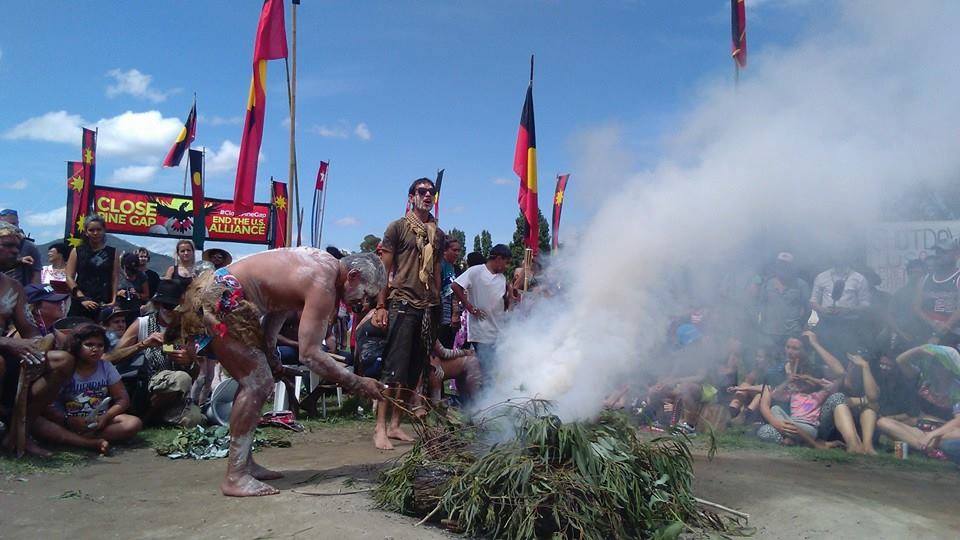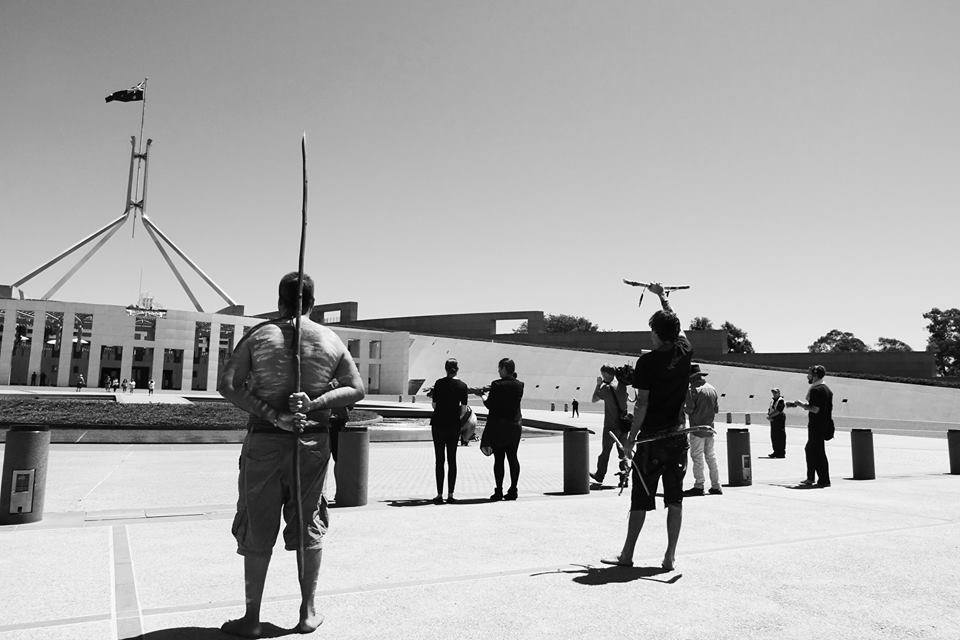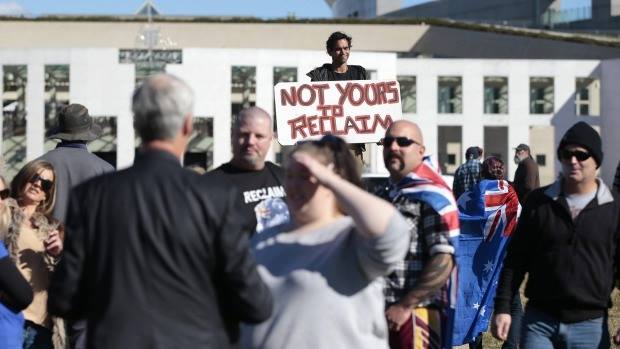– Gus McCubbing interviews Roxley Foley
Due to the work of Gary Foley, the Foley name is synonymous throughout Australia with Indigenous rights activism. However, at a touch over thirty years of age, Roxley Foley, the son of Gary Foley, was the official custodian of the Tent Embassy for over a year and is fast carving out a name for himself within the grassroots movement. Over lunch at the ANU Food Co-Op, Roxley shared with me his family’s background in activism and how this had a profound impact upon his worldview from an early age, as well as his own experiences in activism.
Early Exposure
Growing up around the time of Bicentennial protests in the late 1980s, Roxley says that his early exposure to grassroots activism instilled in him an appreciation for an element of insouciance within activism.
“Before I got to the age of kindergarten and primary school, I was just one of those activist babies, travelling all around the country, running up and down police lines on scooters.”
He believes this element of activism has dried up over time.
“It seems be much more an exercise of venting frustration, and the acceptable theatre of protest…there was a lot more creativity and sort of doing things in a way they weren’t expecting back then.”
His upbringing also provided him with a sense of self-esteem and independence which has never been lost.
“…Unlike a lot of my cousins and brothers and sisters, because I grew up with my Mum and Dad away for a lot of shit going on, I was brought up with a very strong sense of self. I was never given this image that there was anything negative to take as a connotation for being Aboriginal.”
Roxley’s long-held pride can be seen in one particularly nasty encounter with the man responsible for expelling him from school.
“I got kicked out of high school when I was about fourteen, and to quote my year level coordinator who kicked me out, ‘Your people are not academically inclined, and my school’s an academically inclined school, and I don’t want no bloody Abo’s [sic] in my school’.”
Roxley can look back and laugh at the incident, as at the time he simply responded, “My grandfather was a senior PhD chemistry lecturer and my father’s one of the most respected historians in the country, what’s your family’s academic history?”
So, despite a prickly high school experience, Roxley, under the care of his mother, enjoyed great exposure to activism during his early years. Throughout his youth, Roxley says he often worked as a figure of support for both his parents in their endeavours, as well as his maternal grandfather Dr. Dennis Matthews, who was both a chemistry professor at Flinders University and a leading anti-nuclear advocate involved in the shutting down of the Jabiluka uranium mine.
“So I have the upbringing of both Indigenous rights and environmentalism,” he says. “I think the focus on grassroots activism was always very strong, especially in both sides of those movements.”
“…In Indigenous rights one of the main things we were fighting was the ‘Aboriginal Industry’—this industry enveloped in paternalism, and this move towards self-determination, which of course has to be rooted in the grassroots direction of the community.”

Snowballing into Activism
During his stint as a mature-age student at Adelaide University, Roxley began to get more directly involved with grassroots activism. Having enrolled in an Indigenous foundation course, known as the Wirltu Yarlu program, he would eventually become dismayed by the university administration’s ongoing attempts to not only cut the funding of this program, but also the Indigenous students’ housing budget. This, Roxley says, led him to defer for six months, and use the extra time he had to help organise rallies—the first of which was established in response to Julieka Dhu’s death in custody in WA in August 2014.
Following this, Roxley played a hand in the organising of the Summit for Freedom, which took place in Alice Springs in November 2014. The purpose of this summit, which brought together hundreds of elders, as well as community and activist leaders, Roxley says, was to “talk about a state of the union and how fucked it was at the time.”
“I was actually expecting to get speared coming out of Alice Springs because I would constantly end up yelling and screaming at people…and somehow that ended up in them trusting me.”
On the day of the failed Liberal leadership spill in February 2015, Roxley and a group of other delegates from First Nations Freedom Movement then entered Parliament House to deliver the Aboriginal Sovereign Manifesto of Demands to the Minister for Indigenous Affairs, Nigel Scullion.
“I came down with a very large group of young people, and we quickly became the organisational backbone of the camp [at the Tent Embassy] and just kept things running. When the initial meetings were finished and the elders requested we start performing a sit-in which would continue on for time undisclosed, they essentially left me behind to maintain a camp of four hundred people for as long as possible.”
“It was just all a series of snowballing events which then saw me handed the custodianship role of the Embassy and given a green-light by multiple groups of elders who said that this space was originally founded by young people—my father one of them in his early twenties—it was a space about young ideas and trying things differently, and they wanted it to go back to that.”
Although overcome by internal problems for the time being, Roxley had a firm idea for the direction he wanted the Tent Embassy to take in the future.
“We [were] looking at building on that space and opening it up to a range of issues, re-strengthening it as a bit of (a) pressure valve to show some discontent on their lawns, a space where they can’t just get rid of it after sundown as the ‘acceptable protest area’ has ‘acceptable protest times’ attached to it.”
On the Modern Nature of Grassroots Activism
Despite bemoaning the very structured nature of modern protest, Roxley nevertheless upholds the ongoing relevance of grassroots activism, arguing that change is easier to effect than we might think. As Roxley indicates, this steadfast belief is built upon his own knowledge of the history of resistance within Australia.
“The entire Black Power movement which was based on the east coast, was centred around a very small collective, and they managed to change the entire face of the country—small groups of people, on a mission, and being creative about what they do, can have an overwhelmingly large effect.”
However, Roxley also recognises the significance of international pressure.
“For the Indigenous rights movement, most of the largest progresses came about from international condemnation and awareness. We’re still fighting for a mainstream movement around Indigenous Rights in Australia today, and still struggling like hell for that understanding. Things like the Bicentennial protests, the Tent Embassy, the ‘Stolenwealth Games’ protests were all focussed on high jacking national events and bringing that message to a wider world.”
Roxley also emphasises the importance of developing an understanding of Australia’s ostensibly ‘boring’ history. He suggests that this heightened understanding brings with it an ability to better eradicate prejudice and institutional racism. In this regard, he says, the Frontier Wars are particularly important as they signify the beginning of modern Australian history.
“One of the first whitewashings of history is the talk that there was no resistance—the old dying pillow philosophy, that we just passively died out in the face of a superior civilisation.”
“When you look at the actual history records of the massive battles that were fought in areas where the colonisers were held off for years…more people died in the Frontier Wars than Australian soldiers in both World War One and Two combined.”
“The fact that we have no monument or testament to this in our history is still an issue. If you can fix those beginning parts of the story, it then makes you have to fix up the rest of it—because if you start telling the truth there, then the other lies and misconceptions don’t make as much sense.”
According to Roxley, a foundational knowledge of this Australian history is of vital importance to both Indigenous and non-Indigenous youth.
“I always find political history is just as important as the cultural history, because for young Indigenous kids especially, cultural history gives them strength, but political history gives them the understanding of how we got into the situation we’re in today—it connects A to B.”
Combatting Hopelessness and Empowering Community
As Roxley has recently stepped away from the Tent Embassy due to internal problems and personal health issues, I then asked him about the effect fatigue may have upon individuals involved in activism. Surprisingly, rather than physical exhaustion, Roxley says that the most fatiguing element of grassroots activism is the daunting prospect of stagnation.
“When you’re finding that things are actually progressing, it doesn’t matter how much work you’re doing, you can take strength and encouragement from that work. It’s when people get devolved into petty squabbles or when you’re getting burnt out on the smaller sorts of issues that it really latches hold.”
“You need to know how to take that time out, and so I guess it goes back to that question of efficiency—where your abilities are at their most efficient, and where you’re just banging your head against a wall, because that’s not particularly fun.”
On this note, Roxley urges young people and communities to empower themselves. He recognises the ease with which one may consider themselves too inexperienced or unqualified to effect any considerable change. However, rather than waiting for individual academics, or the media, or political spheres more generally to evoke change, Roxley reaffirms that much can, and has been achieved at the grassroots level.
“It doesn’t matter where you come from: everybody knows what makes their lives difficult, there’s not one person alive who doesn’t strive for that point where they can somehow make their lives better and more liveable.”
“The basics of living don’t really change. Although we have all these new technologies and structures, some of the strongest forms of resistance surround the most basic sorts of issues—whether it’s housing, health, or education.”
According to Roxley, most of the social progress made in Australia came from regular people proactively going out and effecting change themselves. As he says, “…we don’t need to wait for the government to be leaders of things.”
“The whole Aboriginal Rights and self-determination movement, and things like the Aboriginal Legal services and health services out in Redfern were founded with no government money whatsoever.”
“They were founded by community, getting funding from international communities to get the workshop space, working in partnership with volunteers from Sydney University law and medical students.”
“These are the sorts of templates that are going to become all the more relevant now as we’re facing the privatised medical system where people can’t afford even basic check-ups and diagnostics.”
“I think a lot of our students today are waiting for when they’ve got that official degree because they think that no one’s going to accept what they do until after.”
“Have confidence in yourself and in the work that you’re doing, and that the work can speak for itself. Not everything has to be perfect, [if] you fuck something up, do it better next time… we’re evolving and learning creatures.”
Finishing up, Roxley reminds me that by Western standards he is in the strictest sense uneducated and has no qualifications. “But that shouldn’t deter people,” he concludes, “because at the end of the day, one of the main things we’re fighting for is community input into decisions.”


